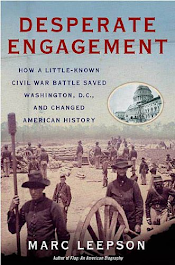Pages
Monday, August 15, 2022
Desperate Engagement by Marc Leepson
Monday, August 8, 2022
Best Commentaries
Based Opinions with a Dash of Cinnamon
I started my writing career as a magazine columnist. No, not political opinions. My columns were about computer technology. My first book, The Digital Organization, was also a nonfiction, computer technology book. Then I lost control of my senses and wrote Tempest at Dawn, a novelization of the Constitutional Convention. Big subject, big book. And big surprise. I loved storytelling. Been at it ever since, and I have now written eleven novels and several short stories.
Tempest at Dawn, my first novel, brought me some unexpected attention. I had a few scary national television appearances and some surprise endorsements. It also brought me invitations to write for Constituting America and What Would The Founders Think? Soon I was in the thick of political blogging. Along the way, I also wrote for RedState and The American Thinker. It should be obvious from names of these sites that I wrote from a conservative perspective, so, fair warning, Best Commentaries is a collection of conservative opinion pieces.
Here’s a sampling.
We often hear laments that our politicians no longer honor their pledge to preserve, protect and defend the Constitution of the United States. This is backward. The Constitution was not written for politicians. Our political leaders have no motivation to abide by a two hundred year old restraining order. Americans must enforce the supreme law of the land. The first outsized words of the Constitution read We the People. It’s our document. It was always meant to be ours, not the government’s. It is each and every American’s obligation to preserve, protect, and defend the Constitution of the United States.
***
Democrats are disappointed because past campaigns did not go the way they wanted. Occupy Wall Street did not incite class warfare, Black Lives Matter did not start a race war, and Antifa did not expose a vast cadre of neo-Nazis lurking in the background.
***
If you lay every economist in the world end to end, you still won’t reach a conclusion. If you want to carry out bad economic policy, it’s not difficult to find a tenured professor to provide the rationalization. Roosevelt, Carter, Obama, and Biden have all applied disproven Keynesian principles … to the same result. Now, remind me, what was the definition of insanity again?
***
Proponents of Big Government used different nomenclatures to describe their ideal system, but they all have one overriding characteristic—power centralized in government. Socialism, fascism, communism, feudalism, monarchies, dictatorships, theocracies, police states, a unitary state, oligarchies, et. al. concentrate power in the state. The underlying political theology is irrelevant. In each and every case, the individual is subject to control by the state. It doesn’t matter who orders you about. It could be a king, emperor, dictator, a party general secretary, or an elected machine politician. The result is the same. You do as you’re told.
***
The United States of America is exceptional, but we are not exceptional because we are a different people. People are the same the world over. We are exceptional because of the uniqueness of our founding. The Declaration of Independence and United States Constitution were not events. They were processes that took many years to come to fruition. They both engaged an entire nation. They both were guided by clear principles. They both reflected timeless truths that inspired us to move ever closer to greatness.
You can order an e-book, paperback or hard cover at Amazon or order a print version from your local book store.
If you like it, tell everyone. If you don't, mum's the word.

